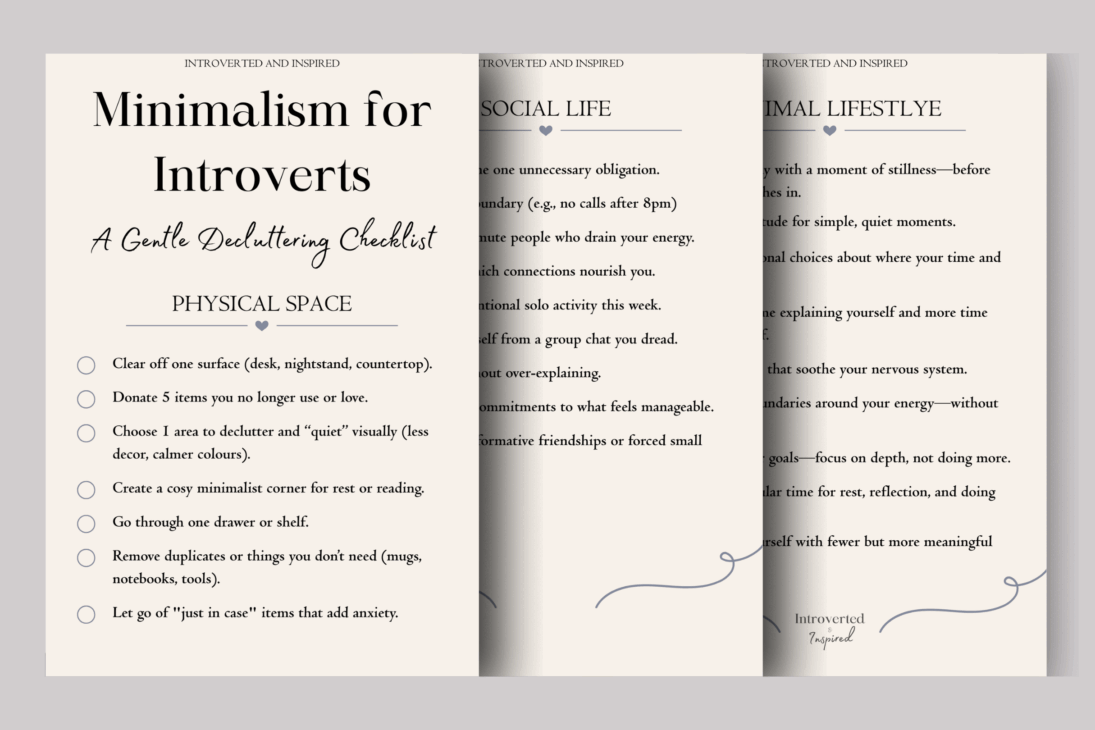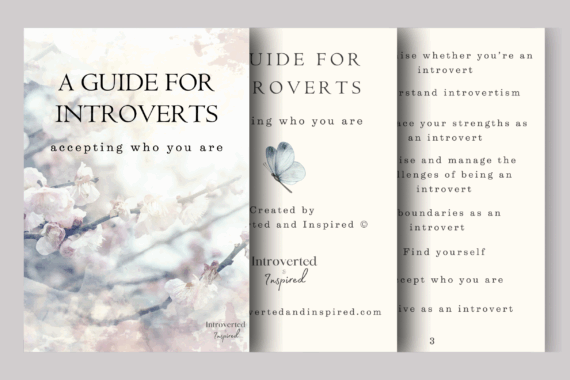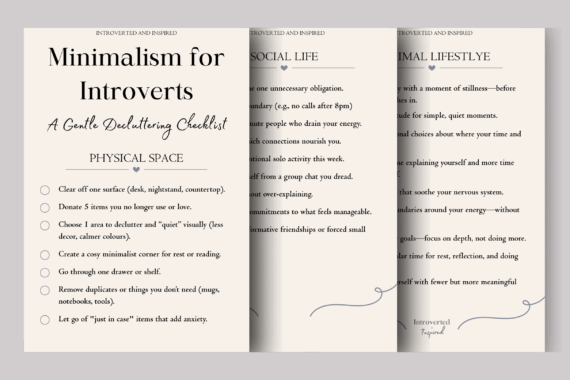In a world that never stops talking, minimalism offers introverts a beautiful kind of quiet. We all know that a cluttered space creates a cluttered mind, and that’s something you probably want to avoid, especially when your mind is likely filled with so much already!
Think of it this way: a cluttered space and mind is the noise you want to avoid, and minimalism is the quiet you want to seek.
If you’re someone who feels overwhelmed by these exact things: clutter, noise, and never-ending social obligations, you’re not alone—and you’re not wrong to crave stillness. This post is your gentle guide to embracing minimalism as an introvert, starting with your space, your digital life, your relationships, and more importantly. . .your mind.

Why Minimalism Speaks to Introverts
Am I right in saying that you love a simple lifestyle? Or you’re looking for ways to make your introvert life more simplistic? One with less noise, less pressure. Less of what drains you, and more of what gently fills you up. A life where your space feels calm, your mind feels clear, and your schedule actually leaves room to breathe.
I’m exactly the same. I don’t care for frills or extravagance. I like things simple and easy to manage—because if they’re not, life feels chaotic.
As introverts, clutter and noise feel like emotional weight. When things are chaotic or unorganised, it’s more than just visual mess—it’s mental noise. And because we’re so sensitive to overstimulation, it really wears on us.
The reason why we love minimalism so much is because it clears space for what matters most. It’s not just about owning fewer things, it’s about having the chance to opt out of the noise and thrive in a more quiet lifestyle.
We want to be able to connect with ourselves—and others—better, and we do that best when our environment is less intense and overwhelming. We’re not boring or lacking for wanting fewer things—physically or mentally. We’re just tuned into what really matters to us—and we let go of the rest.
Decluttering Your Physical Space
As introverts, we know just how important our physical space is for us. It’s our sanctuary, after all, and where we choose to rest and reflect. Which is why it’s so important for it to remain as clutter-free as possible.
Trust me, I know what it’s like to gradually build up clutter without realising it. One day, it can feel like everything has its place and is organised, and the next, there’s too much to even think about sorting out. But in this post, we’re keeping stress to a minimum. So, here are some tips for gently decluttering your physical space without overwhelming yourself:
- Start small: Choose one small space to declutter first. Or go simpler and start with one drawer, one shelf, or even one item.
- Get yourself in the mood: Decluttering might not seem like the most exciting of tasks, but if you put on your favourite playlist or podcast and let it feel like ‘me time’, you’ll find yourself getting a lot more done than you first thought.
- Go for cosy minimalism: Your space doesn’t need to feel empty. Keep it cosy and warm. I always feel that nice lighting makes such a difference.
- Pick one area to keep minimal: If you’re feeling overwhelmed with the amount you have to declutter, pick just one area or room to keep minimal. Make this your clutter-free space for mental rest.
- Try the ‘one-in, one-out’ rule: For every new item that you bring into your home, let one go that you already have.
- Ask yourself, “Would I pack this?”: Imagine if you were to move tomorrow. Ask yourself whether you’d bring this with you. If not, maybe it’s time to let it go.
- Keep a ‘maybe’ box: If you can’t decide, put items that you’re unsure about into a box with a date on. If you don’t reach for them in a month or two, it’s safe to say you’re not going to miss them and you can let them go.
Decluttering Your Digital Life
Our devices are like digital rooms we carry everywhere, but sometimes it can be hard to escape them and the noise they create in our lives.
I’m sure you know what it’s like to be constantly checking your messages, emails, and social media. And I’m sure you can relate to how draining, overwhelming—and not to mention, addicting—it can get. That’s why it’s so important to manage our screen time and keep our digital life minimal. Because a quiet phone, a clear desktop, and a more peaceful online presence will do wonders for your mind.
So, how do you go about decluttering your digital life? Start with these simple things:
- Unsubscribe ruthlessly from emails you don’t read. If you’ve got tons of unread emails in your inbox, it’s just unnecessary clutter.
- Declutter your apps: Again, they’re just unnecessary, especially if you’re not using them. Stick with what you always use and get rid of the rest.
- Organise your digital space: For many of us, our desktop and phone are our workspace, so it’s best to organise it as such. Keep folders and have files, photos and apps in specific places so that your digital space is not cluttered or overwhelming to access.
- Declutter your photos and files: Delete blurry photos, duplicates, or screenshots you don’t need anymore. And backup important files and photos often to keep your mind clear and your memories safe.
- Silence unnecessary notifications: If a notification is not important—meaning it’s something that can wait or doesn’t even need your attention—silence it. You’ll be doing yourself a big favour by not getting distracted by your phone’s constant alerts.
- Unfollow accounts that leave you feeling inadequate, anxious, and drained. If someone isn’t influencing you in a positive way, consider what energy you’re letting into your mind every time you scroll. Don’t follow someone who doesn’t inspire you or hold your values.
- Set digital boundaries: Rather than always feeling the need to check your phone, choose specific times to check your messages, emails, and social media. And, trust me, creating tech-free zones in your home will truly allow your mind to rest.
Social Minimalism: The Beauty of Boundaries
As introverts, we all know how important our social energy is to us. It’s not that we don’t like people or socialising—we just prefer our own quiet spaces.
We may often feel pressured to socialise more, but it’s important to let go of that pressure and protect your own energy. You don’t have to isolate yourself, but instead be intentional about where your energy goes and who gets access to it.
The good news is we can bring minimalism into our social lives. What this means is giving yourself permission to step away from overcommitting, surface-level small talk, social guilt, and any relationships that feel one-sided or draining.
Here are some tips for creating that social minimalism you’ve probably been craving:
- Politely say ‘no’ to things you don’t want to do.
- Let go of guilt: You don’t need to feel bad—you’re protecting your own energy, after all. And that’s what really matters.
- Focus on your inner circle: No matter how small it is, focus on your inner circle, on the friendships that are meaningful and on people who respect your introversion.
- Remove yourself from group chats that aren’t fulfilling or worth your energy.
- Allow yourself time to recharge between social events, whether it’s a day or even a week.
- Declutter your social calendar: Cancel or reschedule what doesn’t feel right or isn’t worth your time.
- Only say yes to what you truly want.
Mental Minimalism: Quieting the Mind
Minimalism isn’t just about clearing space around you; it’s also about creating space within you. Mental clutter is real, and as introverts, I think we feel this heavily because we tend to always be in our own heads, surrounded by endless thoughts and ideas.
But mental minimalism is about letting go of the constant overthinking, unnecessary worry, decision fatigue, and mental noise that crowds your inner world. It doesn’t mean you need to silence your thoughts; you’re simply choosing which thoughts are important and deserve your attention.
Here are some ways you can help quieten your mind and focus on what truly matters:
- Journaling: It’s the best way to get the noise out of your head and onto paper. Get all those thoughts, to-dos, ideas, worries, and reminders out that have been swirling around inside and free up your mental space.
- Limit your consumption: It’s important to realise just how much we’re letting in. As introverts, we absorb a lot, which is why it’s a good idea to look at what we’re consuming and whether it actually benefits us or diminishes our energy.
- Practise mindfulness or meditation: Even 5 minutes of silence can reset your nervous system.
- Simplify your decisions and to-do list: Having too many choices can lead to decision fatigue. Even something as simple as deciding what to wear each day can have an impact on your mental load. So, try to simplify your life in a way that doesn’t overwhelm you.
- Tackle one task or thought at a time: Rather than juggling multiple things at once or letting your mind jump ahead, give your full attention to just one task or one thought. After you’ve given it your full focus, you can move on to the next one without feeling buried in things to do.
- Let go of the idea that you have to say yes to everything. Just because something’s expected doesn’t mean it’s right for you. Not everything deserves your time or energy. Simply choose what truly aligns with your values, and let the rest pass without guilt.
Creating a Minimalist Life as an Introvert
A minimalist life is something that many introverts crave—not just because we like the simple things, but because we want to create enough space for our energy to breathe and our minds to simply be.
There’s no one-size-fits-all minimalist. True minimalism is intuitive. It’s about keeping what supports your inner peace—and letting go of what doesn’t.
Creating a minimalist life as an introvert is bringing everything together that we’ve spoken about so far—decluttering your physical and digital space, focusing on social and mental minimalism—and weaving it all together to suit your introverted nature.
You can also build a minimalist lifestyle by:
- Thinking about what you want more of, and less of. Perhaps it’s less noise, more stillness. Less busyness, more space. Less obligation, more alignment.
- Honouring your introverted rhythms, like enjoying slow mornings and quiet evenings.
- Refining your passions and hobbies: Try not to spread yourself too thin with endless projects and commitments and instead focus on what really grounds you and makes you happy.
- Keeping meaningful items: Think about what is really sentimental to you, because the items you have a deep emotional connection with should be the ones you keep. And the items that don’t speak to you can be let go.
- Live slowly: Life isn’t a race, and it doesn’t need to feel like one. When you slow down, you fully experience life, notice more, and appreciate what it has to offer you.

Feeling inspired? Grab your free printable decluttering checklist to start taking those small, gentle steps towards a more minimalist life.
Remember, minimalism isn’t just about having less, it’s about simplifying. And that doesn’t just mean your surroundings, it also means your entire way of being. It’s moving away from noise and clutter and creating space to fully be yourself. And this space will allow you to thrive. Because the less you carry, the lighter you’ll feel.
When I learnt to create space between moments and appreciate the calm between my thoughts, life became slow and beautiful. And minimalism became the truth I was seeking all along.







